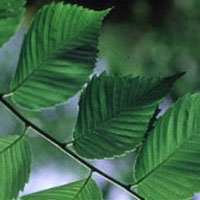
A-Z Indexes Food Health Guides
Health News |
Slippery ElmFind ProductsAlso indexed as:Ulmus fulva, Ulmus rubra  © Steven Foster © Steven FosterBotanical names: Ulmus fulva, Ulmus rubraParts Used & Where GrownThe slippery elm tree is native to North America, where it still grows primarily. The inner bark of the tree is the main part used for medicinal preparations.
Our proprietary “Star-Rating” system was developed to help you easily understand the amount of scientific support behind each supplement in relation to a specific health condition. While there is no way to predict whether a vitamin, mineral, or herb will successfully treat or prevent associated health conditions, our unique ratings tell you how well these supplements are understood by the medical community, and whether studies have found them to be effective for other people. For over a decade, our team has combed through thousands of research articles published in reputable journals. To help you make educated decisions, and to better understand controversial or confusing supplements, our medical experts have digested the science into these three easy-to-follow ratings. We hope this provides you with a helpful resource to make informed decisions towards your health and well-being. This supplement has been used in connection with the following health conditions:
Traditional Use (May Not Be Supported by Scientific Studies)Native Americans found innumerable medicinal and other uses for this tree. Canoes, baskets, and other household goods were made from the tree and its bark. Slippery elm was also used internally for conditions such as sore throats and diarrhea.1 As a poultice, it was considered a remedy for many inflammatory skin conditions. Copyright © 2026 TraceGains, Inc. All rights reserved. Learn more about TraceGains, the company. The information presented by TraceGains is for informational purposes only. It is based on scientific studies (human, animal, or in vitro), clinical experience, or traditional usage as cited in each article. The results reported may not necessarily occur in all individuals. Self-treatment is not recommended for life-threatening conditions that require medical treatment under a doctor's care. For many of the conditions discussed, treatment with prescription or over the counter medication is also available. Consult your doctor, practitioner, and/or pharmacist for any health problem and before using any supplements or before making any changes in prescribed medications. Information expires December 2026. |
